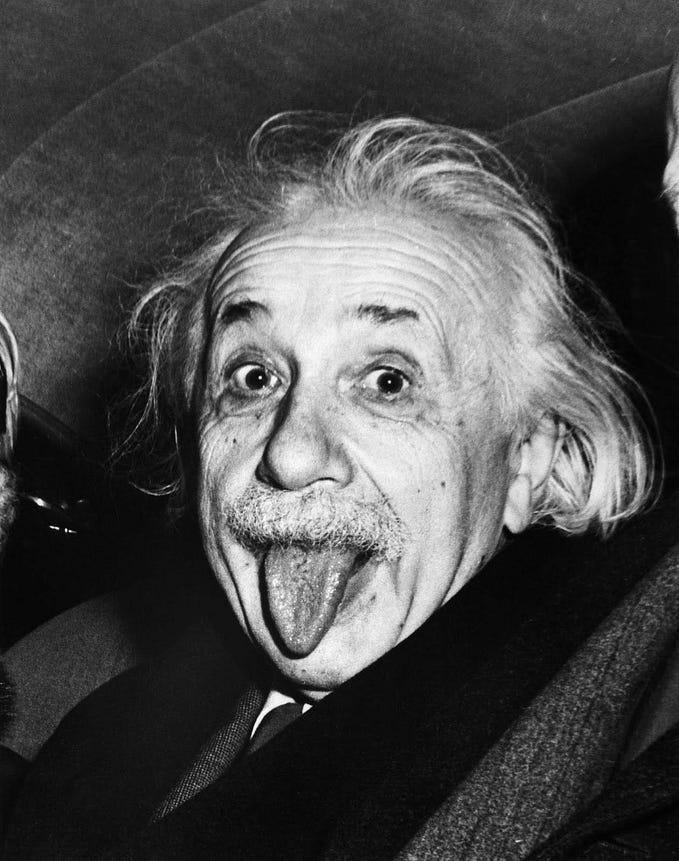You're reading for free via Anthony Fieldman's Friend Link. Become a member to access the best of Medium.
Member-only story
Finite and Infinite Players
We are all players in the human drama. The way we play — by which I mean, the underlying reason — is what determines whether we play finitely, or infinitely.

Of finite and infinite play, only one of these modalities exists to win, and end play for everyone. In the process, it limits our collective reach, as human beings. Finite play issues, frankly, from a broken spirit, or soul. The other, by contrast, exists to continue play — without prejudice, or end — and in the process, it powerfully amplifies us, both individually and as a species. Powerful play is, paradoxically, unconcerned with its own power.
It exists only for the moment — for playing.
Finite Play
Finite play is rule-based. It is played within a contained set of boundaries. It is full of labels. And judgments. And fear. It is antagonistic, and combative, in that the only reason one plays finitely is to win a contest, and to be recognized by others as the decisive victor. In this sense, without an audience, there is no finite play; because without one, there is no one to recognize the title won, which therefore loses all of its value. Titles are only valuable when someone recognizes them. If not, they are as meaningless as claiming to be the ruler of your sock drawer.
Because titles — and their recognition — are the point of finite play, then once a game concludes, the victor lives to protect the past. That is, the now-past contest, in which the title was won. Victors spend the rest of their lives defending their past achievements, because these become inextricable from their identity. Esq. LEED. Ph.D. CEO. Prime Minister. Superbowl XXXIX. Dr. Executive Vice President. Millionaire. Mile-High clubber. Donor. Republican. Christian. MBA. Saint. Guru. Officer. Duchess. Emir. Top 10. Trending.
Finite players look backward, and view the present and the future only as potential threats to past victories. Whether in sports, or religion, or government, or business, or elsewhere, threats to our victories are everywhere. Thus finite players are fearful.
James Carse, the author of the tiny, incredibly dense book, Finite and Infinite Games, says:
“The outcome of a finite game is the past waiting to happen. Whoever plays toward a certain outcome desires a particular past. By competing for a future prize, finite players compete for a prized past.”
By which me means, finite players’ identities hinge on their future past victories.
It is moreover only finite players who become violent. Violence emerges from challenges to one’s past or future past victories. Democrats challenging republicans for a seat in government. Muslims challenging Christians for agreement about the true god. Atheists challenging evangelical Christians for the right to control pregnancy — in one’s own body. Governments challenging powerful corporations for the right to control the flow of information. Lawyers challenging people for the right to control their actions. Blacks fighting police for the right to exist, unmolested. Women challenging men to employment that is economically blind to chromosomes. The New England Patriots challenging the New York Giants for the right to wear metal rings inscribed with victory.
In finite games, there is always a loser.
Finite players are broken for two reasons.
First, they willingly play, in order to defeat others. One cannot force finite play. All players must play voluntarily, or it is not a finite game. In this way, finite players are combative, willingly committing acts of violence — all contests are acts of violence — because they only rest when they have emerged victorious, after having bested — or destroyed — another player, or players, and brought the game to its recognized conclusion.
If all players do not agree on the victor, or that play is over, then the finite game has not come to its conclusion.
The bigger the fight, and the bigger the win, the worse the outcome and/or consequences for the losing party. The small finite game played for a promotion results in the loss of someone else’s increased power, in the form of influence and spend. The colossal game played for control of another continent results in the loss of tens of millions of lives. Seen through another lens, tens of millions of future games will never be played, to challenge the outcome of the winning party’s past victory.
Thus finite play is inherently destructive. So, too, are its players.


Second, more granularly, to engage in finite play is to be willing to diminish the prospects of other humans. This is an act that is not only physically destructive, but it is emotionally destructive, as well. What it means is that finite players inherently suffer from a sickness of the heart, or soul. It is only with sickness that we wage war against others, small or large; seemingly benign, or ‘normal’. The sickness is a form of fear, in my view, exercised. Fear only exists in the context of a paucity — a deficiency — of love. Those who feel sufficiently loved needn’t compete against others, because they are already complete without engaging in contests. Without externals.
Without winning.
They have already won. And from this place — and this place, only — they can begin to play infinite games.
Infinite Play
Infinite players play in order to keep playing. Victory is anathema to an infinite player, because it means the game is over, and he or she can no longer play. Infinite players play not for a prized past, but for an open future. An infinite game is therefore a perpetual beginning, not an end, because infinite players continually play in the present. As Eckhart Tolle is fond of saying, “It is only now. It has only ever been now. And it will only ever be now.”
While most of us may lose our present to an ever-dwelled-on past, or an ever-feared future, some of us are willing to live in the present, through the lens of infinite games.
Take work as an example. Carse says:
“Work is not an infinite player’s way of passing time, but of engendering possibility. Work is not a way of arriving at a desired present and securing it against an unpredictable future, but of moving toward a future which itself has a future.”
The point of infinite play is the play itself, and what it engenders in the realm of possibility. Artists — real ones — are mostly infinite players. They live in the world of the possible — of what has yet to become manifest. The process of playing infinitely with their canvas, whatever it may be, is the game that allows for discovery; of new beginnings. Thus artists are not concerned with whether or not they emerge entitled. The moment they do, they are no longer playing an infinite game. Thus the art is the process, not the product. The moment the product becomes the focus, it enters a finite game. An art product’s sale, or display, or critical assessment, is an act of finite destruction. The engendering possibility has concluded; and the title — fame, fortune, style, virtuosity — limit future play. Now, one is competing either against one’s own past, or an audience of adjudicators, fans and critics.
Infinite play is a process, not an outcome.
Carse calls this an act of poiesis. Derived from the Ancient Greek verb “to make”, poiesis is defined as “the activity in which a person brings something into being that did not exist before,” according to Wikipedia.


Childbirth is an obvious act of poiesis; as is parenting, when the parents don’t play finite games with their own children. So, too, is painting, if the act of painting is in the service of discovery (infinite), and not commercial interest (finite). Love is humankind’s greatest act of poiesis. To love is to bring magic into the world that was not there until it was given.
Trust, openness, empathy, compassion, kindness, hope, equity, laughter, health, safety, vitality, freedom, connection and friendship — these are all acts of creative engenderment — all infinite words. None of these things has a beginning or an end. There is no end state to hope, or health. There is no loser in equity or safety. There is no contest in empathy, or connection. Each of these things can be possessed infinitely, without limit; and none of them can be corrupted, or curtailed, without becoming something else.
These are all infinite values. Meaning, one cannot ‘run out of’ laughter or vitality or freedom or friendship or any openness. They are of infinite supply, unlike the prizes for which we compete, when we play finitely.
Infinite values are employed by people for whom love is in charge. They use this to fuel infinite play.

Trading Finite for Infinite
Civilization, as it is practiced almost exclusively today, is comprised of countless finite games. Nearly every human being engages in them, daily, if not hourly. We define the boundaries of play (venue; weapons; rules; audience; referee; prize) with nearly every act: where we live; where we learn; where and how we work; where and what we eat; how we speak; how we present ourselves; what we believe, and defend; what we share; how healthy we are; what we tell ourselves about ourselves; and how we interact with others, in competition.
Every institution we have created is finite. If one can derive a winner and a loser from any contest, it is a finite game. Media competes for eyeballs, and dollars. Governments compete for control of dollars, among other things. Schools compete for students, rankings and dollars. Students compete for grades, for access, and for future dollars. Lawyers compete for control of just about everything — as proxy players — and for dollars. Police compete for physical dominance. Businesses compete for market share, and dollars. And religions compete for adherents, influence, and dollars.
The reason we do this is because one of the first games we set up, some 13,000 years ago, when we settled down for the first time between the Tigris and Euphrates Rivers in modern-day Iraq, was a finite game to win people, in the form of guaranteed labor. We did this when we decided to grow food, because agriculture was ironically far more labor-intensive than foraging. And so for the first time, we found ourselves in groups larger than our tribes; and because we were fearful of one another, as strangers — but now needed one another to tend the fields — we played our first finite games, with losers (serfs) and winners (overlords).
Once Pandora’s Box was opened, finite battles for control of growing groups of strangers proliferated, and life became more complex.
Gone, too, were the infinite games we played within our tribes, because when we lived in tribes, the loss of any capacity — of any person’s vitality — prejudiced the survival of the whole. Thus the games that were played within tribes were the ones we played exclusively to open up the possibility of continued — future — play for all.
Imagine if we reconsidered our institutions from a contest of command and control — of resources, titles and dollars — to one of infinite beginnings.
Imagine if schools were true incubators — and played perpetual, possibility-opening sets of infinite games — intended only to endow and empower students with increasing ability to play infinitely. Schools would have no grades. There would be no wrong answers — only discoveries made. They would have no curricula. They would have no mandatory hours. They would have no fixed locations. They would confer no diplomas. They would cost no money. They would use love as fuel for creative poiesis — to fuel acts of creation. They would teach empathy, and compassion, and teamwork, and altruism, and provide raw materials with which students could imagine worlds, using infinite values to share experiences only to seed beginnings, rather than defining boundaries. Imagine if these schools traded only in ideas, explored; in things, built; of experiments, conducted; of discourse, encouraged; of philosophies, birthed; and of creations, embodied.
Imagine the population of students that would emerge from such institutions. They might rival the Platonic Academy, where philosophy, science, medicine, dialectics, virtue ethics and skepticism were all created; or the Florentine Renaissance, where humanism, arts, engineering, and the sciences all advanced, greatly; or the Vienna Secession — one of European history’s most outlandishly creative enterprises; or more recently Bell Labs — the erstwhile ‘Ideas Factory’ — where the transistor, the PV panel, radio astronomy, Unix and the laser were all born.

The only impediment to any of these things is our willingness to play infinitely. Doing so would cost us money, rerouted. It would cost us future past titles, lost. It would cost us control, ceded. It would cost us our vaunted past, no longer dragged into our open, newly leveled future.
This would be terrifying to many, many people—those who are wedded and welded to their finite trophies.
It is also the path to freedom from the destruction of infinite human prospects.
It would empower the human race to achieve hitherto unimagined things.
And that’s just education.
Imagine if media, policing, government, law, work, healthcare, economics and economies were all reconsidered, too. Imagine if all of these things were recast using infinite values, where there were no losers; no prizes; no punishments; no contests; no inequality.
No fear.
To do this, we’d have to heal all the people whose hearts or spirits are stuck; who can only feel whole when they are recognized as victors; and who therefore spend their lives defending their prizes — their money, their titles, possessions, their control, their exceptionalism.
Wouldn’t that be something: a human race full of loving humans, perpetually beginning; caring only that play continues, infinitely; ever-present; ever-forward.
A utopia.
All of this is possible. Not only is it possible, it is easy.
We just need to be brave in the face of our fears.
We need to act from a place of love.
If we do, then perhaps others won’t feel the fear we do, or did, when love was withheld enough from us that we fell from grace, and chose to give in to finiteness.
To stop believing in infinity.
We have sold ourselves drastically short of what we are capable, as human beings.
This is the great tragedy.
There is still time to fix it.
Infinite time.
As Carse writes:
“A finite player puts play into time. An infinite player puts time into play.”
Amen.








